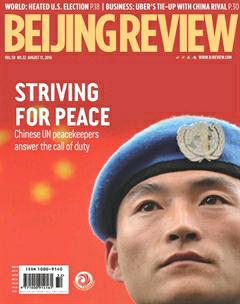A Mongolian Adventure
A Mongolian Adventure
By Brian Salter

Guests are offered glasses of baijiu to accompany their milk tea and mutton-based snacks during a wedding reception in Hulunbuir, Inner Mongolia Autonomous Region, in June
Travel, as the old saying goes, broadens the mind. It’s one of the reasons I decided to come to China in the first place, some five years ago. So whenever I have the chance, I grab every opportunity I can to discover more of this amazing country.
I had often thought about going up to Inner Mongolia to see what the area was like. Not for anything specific—it has just always intrigued me in an odd kind of way. Maybe the stories I’ve heard of Genghis and Kublai Khan and their ilk sweeping across the plains of Asia during the 13th century had something to do with it.
One day, out of the blue, comes an invitation from a company with whom I work with occasionally, asking if I’d like to pop up to Hailar in northeastern Inner Mongolia, which is located some 150 km from the Russian border. Of course, I accepted their offer!
Inner Mongolia is the third largest subdivision of China, spanning approximately 1.2 million square km, or 12 percent, of China’s total land mass. The region is mainly occupied by plateaus that are over 1,000 meters in altitude, interspersed with mountains and plains.
It turns out that since the early 2000s, Hailar has served as the urban district of the newly created Hulunbuir City. Hailar was founded as a garrison town along a crossing of the Hailar River in 1734. The modern district currently has a population of around 280,000, with a large contingent of ethnic minorities.
Hailar’s extreme temperatures range from around -48 to +39 degrees Celsius throughout the year, though during the time I was there it reached 35 degrees before plummeting to around 15 at night.
The town planners have done a wonderful job of putting up statues and sculptures all over the place, which has a straightforward and modest charm about it. Everywhere is clean and fresh—such a change from Beijing’s muggy air.
The official languages here are Chinese and Mongolian, the latter of which is written in the traditional Mongolian script, as opposed to the Mongolian Cyrillic alphabet used in the state of Mongolia. It’s beautiful to look at, with each word being written from top to bottom as a true alphabet, with separate letters for consonants and vowels, in a line running from left to right.
It was only a short drive out into the grasslands from the center of Hailar when I was asked if I’d like to attend a local wedding reception. This is not the wedding itself, I am informed, but something like a prelude. Before the bride-to-be is carted off, literally, to her new husband’s encampment, perhaps over a day’s ride away, the friends of the bride’s family celebrate her forthcoming nuptials without any of the groom’s family present.
The wedding guests arrive, dolled up in their best finery—furry hats, amazing embroidered tunics, and leather boots. It was truly a sight for sore eyes. Inside a large yurt the father of the bride, the local baker, takes time off from making loaves and cakes, and sings traditional verses extolling the bride’s duties. Meanwhile, the women folk presumably try to keep a straight face while being told about their duties... from a man’s perspective.
There is plenty of mutton and baijiu for the wedding guests, who also sip on bowls of Mongolian milk tea, itself flavored with mutton. Apparently, the fattier the meat, the more it is appreciated. This is hardly surprising when you consider the extremely low temperatures the region experiences for so many months of the year. The result, I fear, is that the majority of the local lasses will never earn themselves a place on the Miss World catwalks! But Miss World is the farthest thing from my mind as these truly lovely people do everything they can to make this stranger feel so welcome.
The weekend was truly memorable, and with my mind suitably broadened by the experience, I’m determined to make a return visit to this charming place as soon as possible. Nonetheless, after a surfeit of mutton at every meal, I am determined to give this particular meat a break, at least for the foreseeable future.
The author is a British writer and broadcaster living in Beijing
Copyedited by Bryan Michael Galvan
Comments to yanwei@bjreview.com

